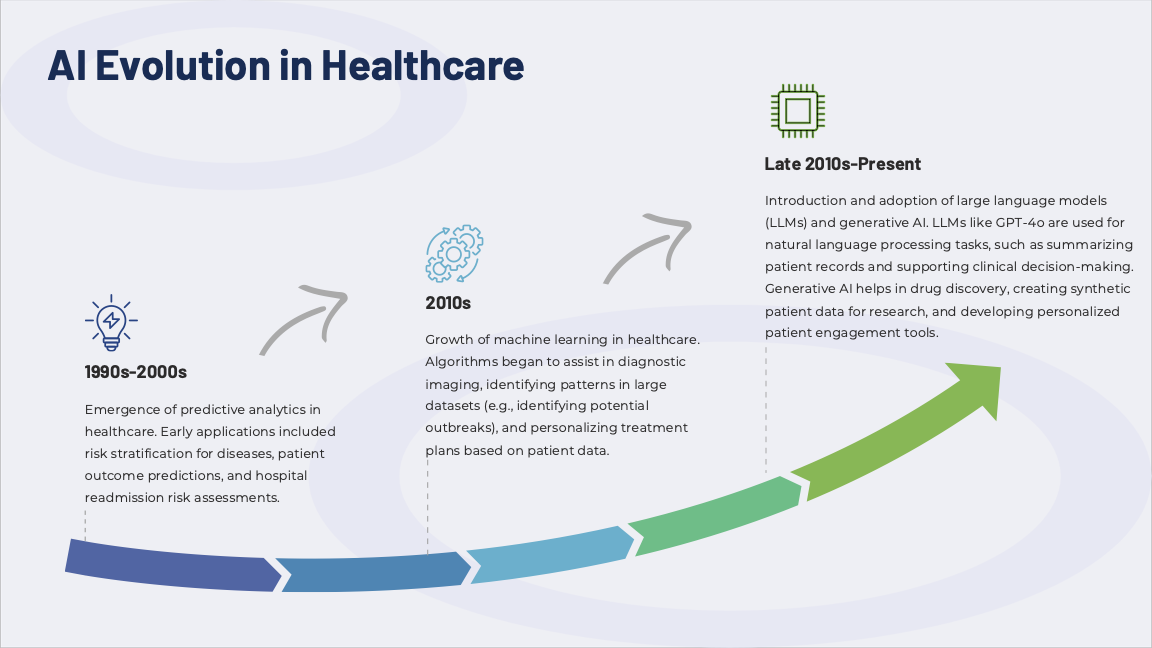The Crucial Conversations series provides dynamic opportunity for participants to hear diverse perspectives and insights from an expert panel with varying vantage points. Attendees also participate in collaborative discussion on what they understood, share their own unique perspective and talk about ways we could collectively address challenges and opportunities in care moving forward. Through curated small group conversations, participants in these sessions unpack the complexity of our industry and think about realistic steps that can be taken to make improvements, even incremental ones.
Understanding AI’s Role in Healthcare: From Basics to Real-World Applications
To kick off our AI is Nothing Without Data Crucial Conversation, we began with an engaging level-set provided by Amy Deaton, President and COO, EvidenceCare.
AI, in essence, involves creating systems that mimic human thinking or task execution. There are several subsets within AI, but we focused on four key areas:
1. Predictive Analytics: This uses historical data, statistical algorithms, and machine learning to forecast future outcomes. It’s one of the earliest AI applications in healthcare.
2. Machine Learning: This involves training algorithms to make decisions and predictions. The more data it processes, the more accurate it becomes.
3. Large Language Models (LLMs): A subset of machine learning, LLMs focus on understanding and generating human language, often through natural language processing (NLP).
4. Generative AI: This type of AI produces new content, such as text, images, or code.
The effectiveness of these AI models hinges on the quality and accessibility of the data they use.
AI’s Evolution in Healthcare Over the Past 30 Years
**1990s**: Predictive analytics emerged, aiding in hospital readmission risk assessments and patient deterioration monitoring.
**2010s**: Machine learning started to play a role in diagnostics, outbreak analysis, and large dataset interpretations.
**Today**: Large language models like ChatGPT and generative AI are in use, with various applications across healthcare.
 [Image Credit: EvidenceCare All Rights Reserved]
[Image Credit: EvidenceCare All Rights Reserved]
To illustrate, let’s follow a fictional patient journey with AI integration.
Fictional Patient Journey with AI Integration
Emma, 45, a mother experiencing fatigue and chest pain, visits her primary care physician (PCP), Dr. Smith.
1. Predictive Analytics: Dr. Smith uses an AI-powered risk assessment tool, analyzing Emma’s symptoms, family history, and health data, identifying a potential cardiac disease risk.
2. Machine Learning: Referred to a cardiologist, Emma undergoes an MRI. AI analyzes the image, finding a small artery blockage.
3. Generative AI: The cardiologist creates a treatment plan, documented through AI-powered ambient listening, and integrates it into Emma’s electronic health record (EHR).
4. Patient Engagement: Emma uses personalized patient education tools to understand her upcoming angioplasty procedure, feeling more empowered.
5. Remote Monitoring: Post-angioplasty, Emma wears a device for real-time vital monitoring, ensuring any issues are promptly addressed.
[Image Credit: EvidenceCare All Rights Reserved]
While this story highlights AI’s potential to enhance healthcare, real-world implementation involves challenges like data silos and accessibility.
In our next “AI is Nothing without Data” Crucial Conversations recap we will transition from fictional to real-world insights and experiences from the front lines from our expert panel: Sherri Zink, SVP & Chief Data Engineer, BCBST, Dr. Lynn Simon, President, Healthcare Innovation & Chief Medical Officer, CHS and Tammy Hawes, Founder & CEO, Virsys12, moderated by Amy Deaton, President and COO of EvidenceCare.
Join the Next Installment in the Nashville Health Care Council’s Crucial Conversations Series
The conversations continue November 13, 2024 on the crucial topic of workforce. Members of the Nashville Health Care Council can register today. Not yet a member? Join our experienced and robust ecosystem of healthcare leaders.
The Nashville Health Care Council strengthens and elevates Nashville as the Healthcare City. With a $68 billion economic impact and 333,000 jobs locally, Nashville’s healthcare ecosystem is a world-class healthcare hub. Founded in 1995, the Council serves as the common ground for the city’s vibrant healthcare cluster. The Council offers engagement opportunities where the industry’s most influential executives come together to exchange ideas, share solutions, build businesses, and grow leaders.